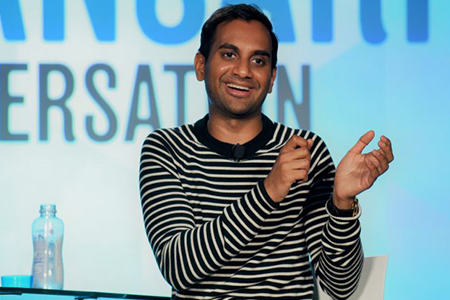Original Print | Jan 17, 2018 | The Print
That’s been the reaction, far and wide, to the fall from grace of the Master of None. He was supposed to be one of the good guys, the one with the ‘Time’s Up’ pin at the Golden Globes.In a country, which adamantly refuses to recognise “marital rape”, we are still far away from these complicated conversations about sex, coercion, entitlement and misogyny in the bedroom.
Et tu Aziz Ansari?
 That’s been the reaction, far and wide, to the fall from grace of the Master of None. He was supposed to be one of the good guys, the one with the ‘Time’s Up’ pin at the Golden Globes.
That’s been the reaction, far and wide, to the fall from grace of the Master of None. He was supposed to be one of the good guys, the one with the ‘Time’s Up’ pin at the Golden Globes.
Then the Babe story burst that bubble. South Asian actors, male ones that is, always complain about being de-sexualised in Hollywood. They can play nerds or shopkeepers, but at best objects of affection rather than hot-blooded desire. Ansari’s Master of None began with a sexual encounter where a condom breaks. It was sex, but it was still comedy. Now we get to see a brown face in America in a different kind of sexual light, as an assailant. And it’s not funny.
If there’s one thing the Aziz Ansari story might teach us, it is that there are no easy answers, that as much as we want this to be Harvey Weinstein black-and-white, the shifting boundaries of sexual relations between men and women remain stubbornly grey.
For those who believed that the #MeToo movement was casting its net too wide, the sexual play-by-play between Ansari and the woman identified as “Grace” was proof that the movement had finally tipped into mudslinging, washing the dirty laundry of a bad hook-up in public. “3000 words of revenge porn” as a piece in The Atlantic dubbed it.
For those on the other side, this was an example of women finally finding the voice to speak up about humiliation and indignity in the workplace and bedroom. It was proof that this did not just happen on a casting couch, and that even woke men with politically correct pins on their lapels could not check their sexual entitlement.
But as I read more and more about it, I found myself agreeing with much that was written on both sides. Grace was not being hit on by her boss, she was herself interested in Ansari, she had made the first move. Why didn’t she feel empowered enough to walk out or at least speak out, instead of, as she put it “pulling away and mumbling” and “physically giving off cues that (she) wasn’t interested”? On the other hand, why are we talking more about Grace speaking up or walking out, instead of an Ansari stopping when she finally says, “I don’t want to feel forced because then I’ll hate you”?
Both arguments sound legitimate. And that’s not a bad thing. It shows that the debate is venturing into trickier terrain, that it is becoming more deeply and complicatedly personal as evidenced by the number of bravely personal stories this has triggered among those commenting on it.
The Weinstein debate was much safer. Most of us have never been in that situation, of being an actor faced with a powerful studio mogul’s invitations to a massage and more. As men, we can take comfort that we were never a Weinstein, never the one who shoved their hand down a woman’s shirt, or asked someone who worked for us to watch us masturbate.
Sandip Roy is a journalist, commentator and author.
